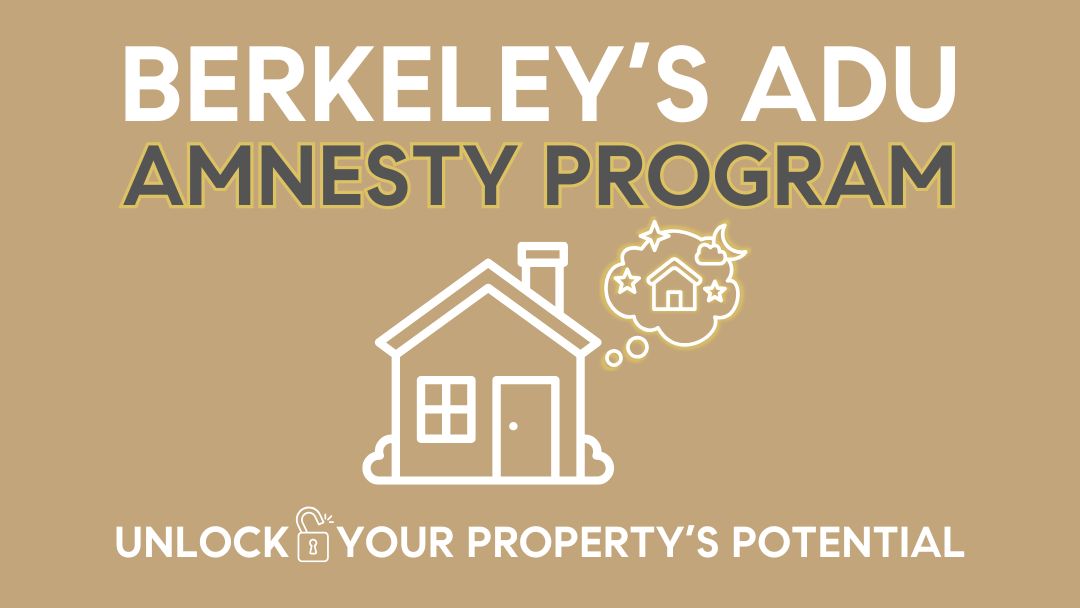Accessory Dwelling Units (ADUs) can be a great asset for homeowners, providing additional living space, rental income, and flexibile housing arrangements. In an effort to increase the availability of housing units, the city of Berkeley has been making it easier and faster to build ADU’s and recently proposed new rules to allow ADUs to be sold as condominiums. However, unpermitted ADUs – those built without formal city approval – may pose challenges for property owners. These challenges include safety risks, reduced property value, and potential legal liabilities. To address this issue, the City of Berkeley has launched the ADU Amnesty Program, a time-limited initiative designed to help homeowners bring unpermitted units into compliance with a streamlined process and minimal penalties.
Legalizing your ADU under this program ensures the safety and legality of your unit while unlocking financial and practical benefits. For Berkeley property owners, this is an opportunity to improve their homes’ value, marketability, and compliance without fear of hefty fines or protracted legal battles.
Let’s dive into the details of the program, its benefits, the risks of inaction, and how you can take advantage of this unique opportunity.
What Is Berkeley’s ADU Amnesty Program?
Berkeley’s ADU Amnesty Program offers homeowners a pathway to legalize unpermitted ADUs with reduced financial and legal risks. By coming forward voluntarily, property owners can have their units inspected, brought up to code, and officially recognized as part of their property. The program, which runs through December 31, 2026, aims to increase housing availability in Berkeley, improve safety standards, and add value to properties with unpermitted units.
This initiative acknowledges that many homeowners may not have realized the full implications of building or maintaining an unpermitted ADU. Instead of penalizing these property owners, the city is offering an opportunity for compliance that benefits everyone involved: homeowners, tenants, and the broader community.
Timing: Why Act Now?
The ADU Amnesty Program is a limited-time initiative. Once the program ends, homeowners will no longer benefit from reduced fees or leniency in addressing code violations. Delaying action increases the risk of significant costs and legal complications in the future. Early participation allows for comfortably scheduling inspections and vendors, and to spread out the financial burden of possible upgrades. It also positions you to benefit sooner from an increase in your property’s assessed value.
Moreover, the program is designed to be collaborative, offering guidance and support to homeowners who take proactive steps. Acting now ensures you have ample time to navigate the process without the pressure of last-minute deadlines.
Risks of Inaction: Tenant Complaints and More
One of the most pressing risks of maintaining an unpermitted ADU is the possibility of tenant complaints. If you rent out your unpermitted unit, your tenants could report the property to the city for safety concerns or disputes over lease terms. Once reported, the city is obligated to investigate, and you could face:
- Significant Fines: Without the protections of the Amnesty Program, penalties for code violations can be substantial.
- Eviction Orders: If the unit is deemed unsafe, tenants may be required to vacate immediately, leaving you with a vacant, non-compliant unit.
- Increased Legal and Construction Costs: Outside of the program, you will not benefit from fee waivers or reduced penalties, and required upgrades could become more expensive.
Even if your tenants never report the property, unpermitted ADUs can lead to complications during property sales or insurance claims. Prospective buyers may view unpermitted units as a liability, which can result in lower offers or delayed transactions. Insurance companies may also deny claims related to the unit if it is not up to code.
Costs of Legalizing Your ADU
Legalizing your ADU under the Amnesty Program involves several steps, each with associated costs. However, the city has made a concerted effort to reduce financial barriers for homeowners. Key costs include:
- Permit Fees: While standard permit fees can be costly, the Amnesty Program offers reduced or waived fees, depending on the scope of the project. There is, however, a $590 program application fee.
- Inspection Costs: A professional inspection is required to identify non-compliant aspects of your unit. The city has streamlined this process to minimize costs for participants.
- Renovation and Compliance Costs: The most significant expense is likely to come from construction or upgrades needed to meet current building and safety codes. This might include adding fire safety measures, upgrading electrical systems, or installing proper ventilation.
- Professional Assistance: You may need to hire an architect, contractor, or permit expediter to ensure your unit meets the city’s requirements.
Despite these costs, the financial benefits of legalization often outweigh the expenses. A legalized ADU adds measurable value to your property, improves safety, and reduces your liability as a property owner.
The Benefits of Legalizing Your ADU
Legalizing your unpermitted ADU may bring substantial advantages for Berkeley homeowners. Most notably, it increases the official appraised value of your property by factoring in the ADU’s additional square footage, bedrooms, and bathrooms. This can significantly boost your home’s marketability if you decide to sell. Buyers are more likely to purchase a home with a fully permitted ADU because it offers the promise of rental income and eliminates legal uncertainties.
Legalization also ensures your unit complies with modern safety standards, providing peace of mind for you and any occupants. Whether you use the ADU for rental income, guest accommodations, or family housing, knowing it meets fire, electrical, and structural codes is invaluable.
Another key benefit is enhanced financing opportunities. Higher appraised property values can enable buyers to secure larger loans, making your home more attractive on the market. For current owners, this increased equity can be leveraged for refinancing or securing home improvement loans.
How to Get Started: A Step-by-Step Guide
Legalizing your ADU under the Amnesty Program involves several straightforward steps:
- Initial Assessment: Determine whether your ADU is eligible for the program. Generally, the unit must have been constructed before the program’s start date.
- Submit an Application: Contact the City of Berkeley’s Planning and Development Department to initiate the process. You’ll need to provide basic documentation about your property and the ADU.
- Schedule an Inspection: A city inspector will evaluate the unit for compliance with current safety and building codes. The inspection will identify areas requiring improvement.
- Develop a Compliance Plan: Based on the inspector’s findings, work with a licensed contractor or architect to create a plan for bringing the unit up to code.
- Obtain Permits and Complete Work: Secure the necessary permits and complete the required construction or upgrades.
- Final Approval: Once all work is completed and inspected, your ADU will receive official approval, making it fully compliant and recognized.
Take the Next Step
Berkeley’s ADU Amnesty Program is a unique opportunity to enhance your property’s value, ensure safety, and reduce legal risks. Whether you’re looking to sell your home, maximize its rental potential, or simply gain peace of mind, legalizing your ADU is a smart investment.
To learn more about the program, visit the City of Berkeley’s Amnesty Program webpage. If you’d like personalized guidance, contact me for a free consultation – I’m here to help you unlock your property’s full potential.




